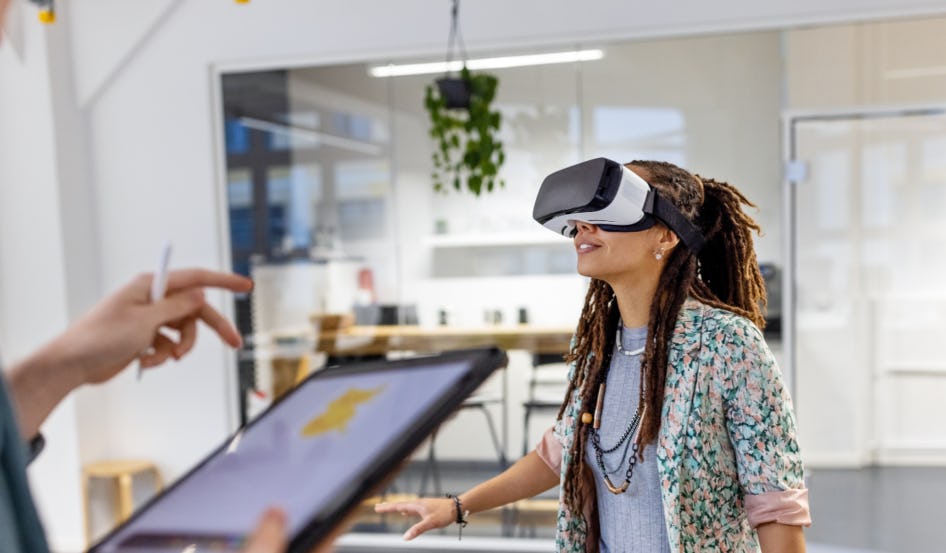
The metaverse is commonly hailed as the evolution of video conferencing. We’ve all heard how this ground breaking technology will take hybrid working to a whole new level, but these superlatives do little to paint a picture of what workers can hope to experience through the metaverse.
What is it like to work in the metaverse? What does it look like? What does it feel like? And how does it make interacting with colleagues feel different from video conferencing?
Regus – our sister brand which has over 3,000 office locations in a sprawling global network – recently commissioned its biggest survey to date, investigating what changes the metaverse will bring to work and business. Canvassing the views of company leaders and office workers alike, this white paper yields some fascinating insights into what working in the metaverse really looks, sounds and feels like.
Let’s start at the beginning. What is the metaverse?
The metaverse is a virtual space where colleagues can come together to meet and collaborate in a fully-realised digital environment accessed via a VR headset. As such, meetings can take place anywhere from a digital facsimile of a company HQ to the surface of the moon. It’s an altogether more dynamic and immersive experience.
Meta employee Sammy King describes the metaverse as “a bizarre but amazing experience” that allows for interactions with colleagues that are far more dynamic and fluid than video conferencing calls. Colleagues communicate via virtual avatars in digital spaces, allowing for intimate collaboration no matter how far apart team members are spatially.
“You get this really amazing sense of presence, which is very difficult to articulate,” King told Regus. “Over the last two years we’ve got used to talking to people on screens but now suddenly you can feel like you’re in close proximity to people even though you’re all working in different places. It’s a real game changer.” With the world embracing hybrid working at pace, this kind of intimacy will bring together dispersed teams in an even more effective and rewarding manner.
Other key elements of the tech include 3D virtualisation, which enables objects to be virtually twinned in the metaverse, while universal translation carried out by metaverse platforms will allow colleagues from different corners of the globe to communicate in their native languages so seamlessly it feels like real-time.
How will workers benefit from the metaverse?
Regus’ white paper shows that both workers and business leaders see enormous potential in the metaverse. Meta founder Mark Zuckerberg has already invested north of $10bn developing what he bills as “the successor to the mobile internet” and intends to spend many more billions in the coming years.
Microsoft’s Satya Nadella also sees great potential in the metaverse, with plans to introduce 3D avatars to MS Teams via its Mesh virtual experience platform. Tech giants aren’t the only ones behind the metaverse. Regus’ study revealed that many business leaders and their employees were excited by the benefits it could bring to their working lives.
- 65% of business leaders believe the metaverse will transform their operations more than any other video conferencing technology
- 44% of office workers think the metaverse will improve their communications
- 35% of workers and business leaders believe that the metaverse will improve their onboarding and training procedures
Creative benefits
When asked which aspects of office life would be likely to improve in the metaverse, 41% of Regus’ respondents chose creativity.
Conventional conferencing tools can make creative collaboration feel stilted and unwieldy. The metaverse has the potential to take collaboration and creativity to new heights. With 3D technologies that can recognise forms and shapes, collaborators can turn simple sketches into 3D objects. They can share and manipulate assets in secure virtual environments without worrying about their work being stolen, copied or shared without permission.
Mental health benefits
Crucially, the metaverse can potentially restore the social aspect of collaboration to team members who occupy different physical spaces. This can provide a mental health boost to those who suffer from the solitary elements of their working life; an issue that the lockdowns during the pandemic pulled into sharp focus.
Promisingly, more than 50% of the leaders questioned in the Regus survey agreed that the metaverse could improve hybrid and remote working with social experiences that offset the feelings of isolation and disconnection that can become common among distributed workers.
Through the metaverse, even fully remote teams can benefit from shared social experiences. In late 2021, US startup Offbeat Media Group opened a ‘Virtual Clubhouse’ for its fully remote team offering a variety of virtual experiences from social gatherings to concerts. Such developments can provide workers with all-important feelings of connection to their colleagues, and ensure that work isn’t just about ‘work’.
Flexspaces: The gateway to the metaverse
We still have a way to go before the metaverse becomes as ubiquitous as, say, the smart TV. Not every home has the infrastructure to make working in the metaverse viable. But hybrid working networks and their flexspaces are set to shine in this new technological age, providing the connectivity and distributed teams that are already primed for new, forward-thinking modes of collaboration.
So slip on your VR headset and get ready to rethink what hybrid working can be. We’ll see you in there!
Download the Regus white paper to see how businesses are using metaverse technology and how it could help to transform your operations.
Share this article
 Read now How the ‘worth it equation’ is re-humanising the workplace
Read now How the ‘worth it equation’ is re-humanising the workplace
 Read now Happy Friday: Are offices emptying a day early?
Read now Happy Friday: Are offices emptying a day early?